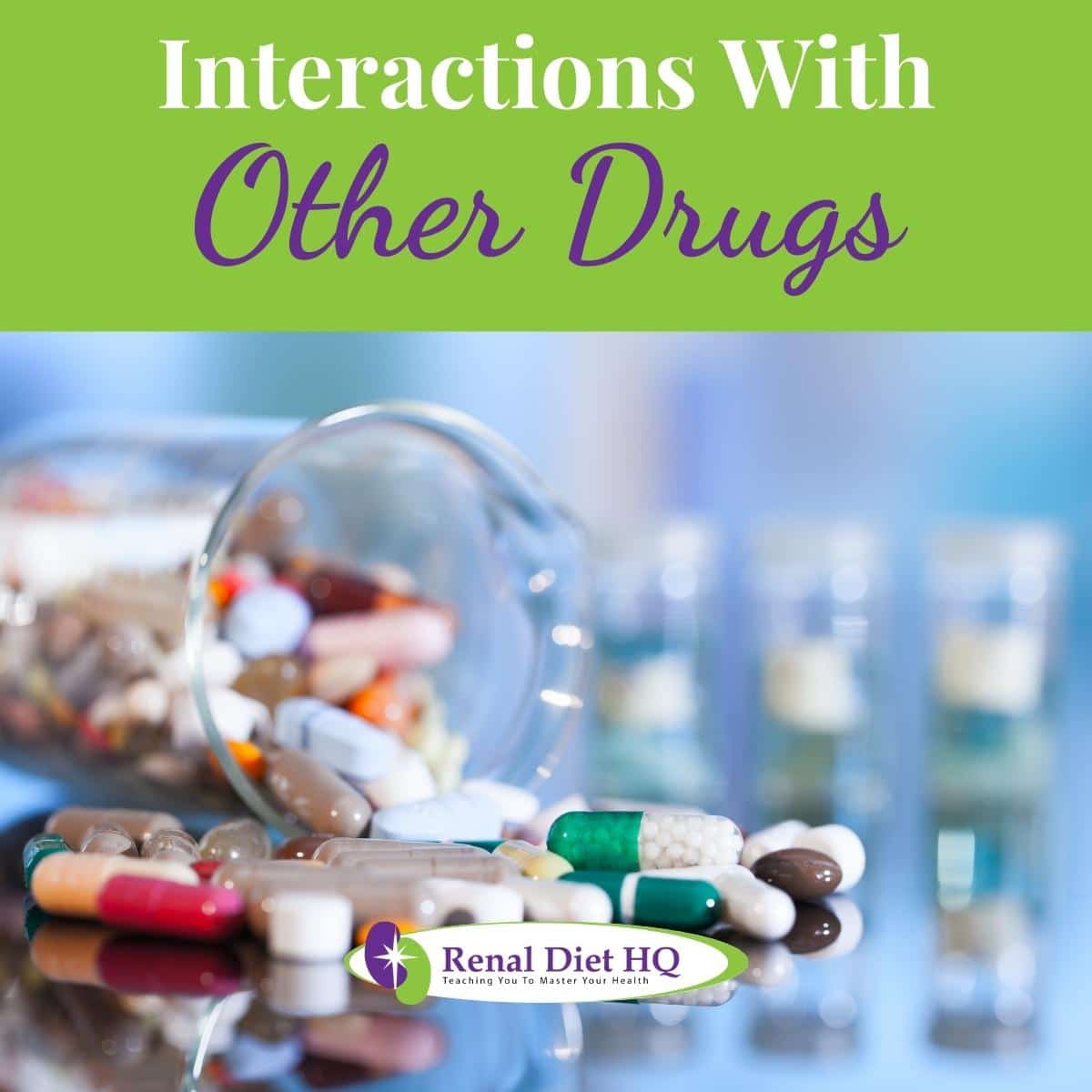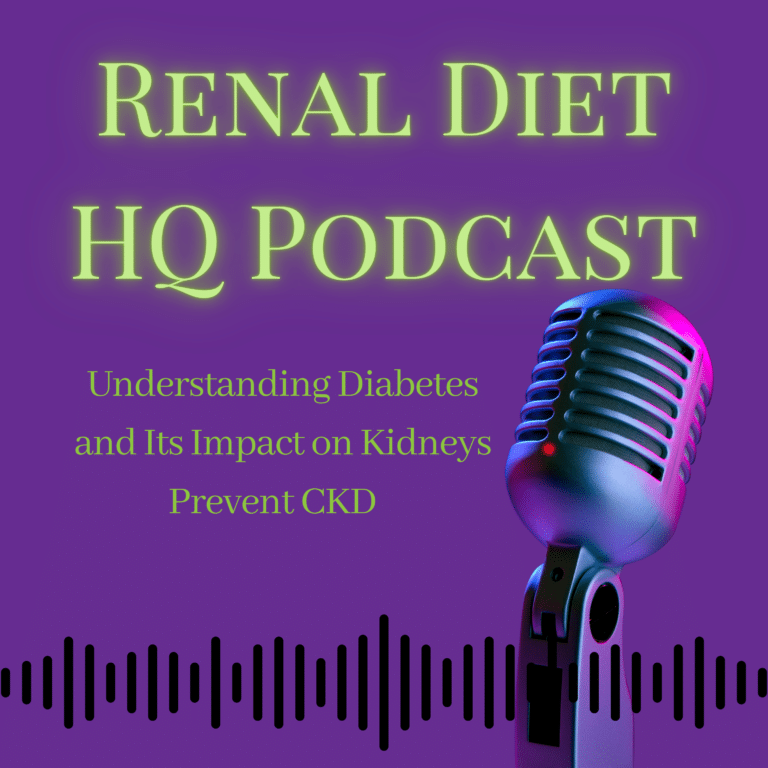Is Benadryl Bad For Your Kidneys?
We all know how important it is to look after our kidneys – they are essential for filtering impurities from our blood and keeping us healthy. But it's worth knowing if taking Benadryl can have a negative effect on them.
In this article, we will explore the potential risks that come with using this common medication and what you should consider when deciding whether or not it's right for you.
As a Registered Dietitian with over 25 years of experience, I provide evidence-based guidance on managing Chronic Kidney Disease (CKD) safely. After my mother’s CKD diagnosis, I created a trusted resource to help others navigate medication and dietary concerns. I stay up to date with CKD research, ensuring my recommendations—like those on Benadryl safety—are both accurate and practical.

When we're feeling unwell, many of us turn to over-the-counter medications like Benadryl to relieve symptoms such as allergies and colds. Unfortunately, these medicines may cause uncomfortable side effects and even damage your kidneys if taken in high doses or too frequently.
So before reaching for the medicine cabinet, let’s take a closer look at the pros and cons of using Benadryl – so you can make an informed decision about your health.
Jump to:
Understanding Antihistamines
Benadryl belongs to the drug class of antihistamines, and goes by the generic name of diphenhydramine. Antihistamines are drugs used to treat allergies and other conditions such as common cold symptoms. They come in various forms, including pills, liquids, nasal sprays, and eye drops.
Some side effects of antihistamines include drowsiness, dry mouth, and dizziness. It's important to be aware of any interactions between antihistamines and other drugs before taking them.
For example, taking Benadryl with other medications could cause them to interact, affecting their effectiveness. So it's important to talk to health care professionals before taking any antihistamines.
For More Recipes and Ideas --->> Get Your Free Meals and Recipes That Are Perfect for Pre-Dialysis Diets, Pre-Dialysis with Diabetes, or Dialysis Diets.
Types Of Antihistamines
Antihistamines are medications used to treat allergies and asthma, nasal congestion, and skin reactions. Let's take a closer look at their chemical makeup.
There are two main types of antihistamines: H1-blockers and H2-blockers. Both work by blocking histamine receptors in your body which helps reduce allergy symptoms. H1-blockers are generally taken orally for things like hay fever or hives. H2-blockers are commonly used to treat gastric ulcers and other acid-related diseases as they cause decrease in stomach acid production.
While these medications can be very effective in managing allergies and other conditions, it's important to note that there may be some side effects associated with both types of antihistamines, including drowsiness or dry mouth.
It is also important to talk to your doctor before starting any type of medication regimen as they will be able to discuss potential risks or interactions with other medications you might already be taking. With the right care plan tailored specifically to you, this could help ensure that you get the most out of your treatment without putting yourself at risk.
Side Effects
Although antihistamines are a great way to manage allergies and other conditions, it’s important to be aware of the possible side effects. Common side effects include drowsiness, constipation, dizziness, dilated pupils, blurred vision, increased heart rate, decreased sweating, and dry mouth.
If you're considering taking an over-the-counter medication such as an allergy pill or sleep aid, make sure to check with your doctor first in case there's a chance of interfering with any other drugs you may already be taking. Additionally, if you don't want to rely on medications to treat your allergies, some natural remedies exist that can provide relief without the risk of side effects.
Allergy testing can help narrow down which treatment option is best for you depending on how severe your symptoms are. So don't hesitate to talk to your physician about what kind of treatments would work best for you!

Interactions With Other Drugs
While these medications are effective at providing symptom relief in the short-term, long-term use may lead to more serious consequences due to potential interactions with other drugs you're taking. Drug combination is an important consideration especially when you need to take additional nonprescription medications. It’s best to consult your doctor if you believe an antihistamine would benefit you.
They'll help determine the best course of action for treating your symptoms while minimizing any risks from drug interactions or unexpected side effects. So don't hesitate to get all the facts before diving into a treatment plan - this way you can make sure you stay safe and healthy!
Potential Kidney Risks
Yes, long-term use of Benadryl can put strain on the kidneys, as it can build up in the system. This can cause toxicity and potentially lead to kidney damage.
It's important to be aware of the potential side effects of long-term use and to consult a doctor if any symptoms arise. Additionally, it's advisable to limit the amount of Benadryl taken in order to prevent further strain on the kidneys.
Long-Term Use
It's no secret that Benadryl is widely used to treat allergic reactions and other ailments. But, did you know that long-term use of the drug could potentially have a negative impact on your kidneys?
That's right - there are potential kidney risks associated with taking this medication regularly over an extended period of time. Fortunately, natural remedies are available if you want to reduce your use of Benadryl.
When it comes to addressing allergies or colds, many people turn to alternative natural remedies like honey and ginger for relief instead. Not only can these plant-based solutions provide temporary relief from symptoms, but they also don't carry the same risk as medications when taken in larger doses or over longer periods of time.
Additionally, certain herbs such as turmeric can help reduce inflammation and minimize discomfort without posing any threat to your kidney function.
But if you still decide to go ahead with taking Benadryl as your treatment option, it’s important to keep an eye out for possible drug interactions and side effects that could occur due to its regular consumption.
In particular, those who already have compromised kidney health should exercise extra caution when considering whether or not this option is suitable for them since it has been known to cause further damage in severe cases.
All in all, be sure to consult with medical professionals before making a decision about what route to take towards allergy management.
Kidney Damage
When it comes to potential kidney risks, allergies and asthma are two conditions that should be taken seriously. While Benadryl may provide temporary relief for these ailments, its long-term use can have an adverse effect on your kidneys.
Not only can this lead to further damage if you already have a compromised renal function, but it could also increase the risk of developing certain kinds of kidney diseases. To prevent any unwanted side effects or lasting health issues, consider making lifestyle changes and opting for natural remedies like honey or ginger instead.
Making small tweaks in your approach towards allergy management now can help save you from facing bigger problems down the line!
Benadryl And Kidney Disease
Let's start by talking about Benadryl dosing and how it affects the kidneys. We can then move on to discussing the potential side effects that it can have on the kidneys.
Next, let's consider any research that's been done on the link between Benadryl and kidney damage. Finally, let's discuss any steps that can be taken to reduce the risk of Benadryl-related kidney damage.

Benadryl Dosing And Kidney Damage
It’s no wonder why so many of us turn to Benadryl when we have allergy symptoms – it's an over the counter, widely available drug with active ingredients known as diphenhydramine. But is this convenient form of relief also doing harm to our kidneys? Let’s take a look at what science has discovered about the link between Benadryl and kidney damage.
The research on this topic is limited but there are some studies that suggest that long-term use of drugs like Benadryl (which comes in various brand names) could be linked to adverse effects on renal function. One of the possible effects of diphenhydramine to the kidneys is urinary retention due to its anticholinergic effect. This can lead to kidney damage in the form of acute kidney injury due to the inability of the urine to flow out of the body.
Side effects from long-term use of antihistamines like those found in Benadryl include drowsiness, dry mouth, urinary retention, headaches, and dizziness - and adding possible side effects related to kidney function is something we all need to consider carefully.
It may be worth discussing your allergies and treatment options with your doctor if you're concerned about potential risks associated with using products containing diphenhydramine such as Benadryl.
Benadryl And Dialysis
It’s clear that Benadryl can have a range of side effects on the body, and it's important to consider if these could cause harm. This is most important for patients with advanced kidney disease undergoing forms of renal replacement therapy such as dialysis (hemodialysis or peritoneal dialysis) and following their dialysis diet restrictions.
In order to understand what impact long-term use of antihistamines like those found in Benadryl may be having, working with your allergist and nephrologist (kidney doctor) is key. An allergist can help you determine if alternate treatments or over the counter medications might be more suitable for your particular allergies. Your nephrologist can advise you on changing your dosing or medications depending on your condition.
To date, there are limited studies on the effects of diphenhydramine on those on dialysis. However, there are reports of overdose when this drug reaches toxic levels. This is because this active component of Benadryl binds well to proteins in the blood, making them more difficult to be cleared out during dialysis. Hence, there is a tendency for excess diphenhydramine to accumulate in the body and exert unwanted side effects.
For those who are already taking Benadryl regularly and want to minimize potential risks related to their kidneys, there are some alternatives available. Other brands such as Claritin or Allegra offer similar relief from allergy symptoms but don't contain diphenhydramine - this may result in fewer long term side effects, though further research needs to be done before making any definitive conclusions.
When considering whether or not we should take Benadryl for extended periods of time, it's important to weigh up all factors involved – including potential impacts on renal function as shown in your eGFR blood test.
With expert input and careful consideration of all options (including Benadryl substitutes), everyone has the opportunity to make an informed decision when treating their allergies while reducing risk associated with long term effects.
Frequency Of Benadryl Use
Daily Benadryl use can be beneficial for treating allergies, but it's important to be aware of the potential side effects. Long-term Benadryl use can be detrimental to your health, especially if it causes issues with your kidneys.
Therefore, it's important to discuss any potential risks with your doctor before taking Benadryl regularly. It's also important to be mindful of the recommended dosages and follow them closely to ensure you're taking the correct amount.
Daily Benadryl Use
Those who take it on a regular basis should be mindful of symptoms such as drowsiness, dry mouth or eyes, constipation, dizziness and more that could potentially occur with long-term usage. As everyone responds to medications differently, it’s best to carefully monitor any potential changes in your body while taking Benadryl regularly and contact your physician if necessary.
Taking this into consideration will go a long way towards ensuring healthy kidneys and overall well being.
Long-Term Benadryl Use
It’s important to keep in mind the risks associated with long-term Benadryl use. This can include drug interactions and abuse, as well as potential damage to your kidney health if taken for extended periods of time.
Again, it's essential to be aware of warning signs such as drowsiness, constipation, dry mouth or eyes, dizziness, and more that could occur when taking this medication regularly. If you're looking at alternative options, ask your doctor about safe alternatives they may be able to recommend instead.
With these points in mind, it can help ensure you stay healthy while still managing allergies effectively.
Dosage And Duration Of Benadryl
When it comes to being aware of your Benadryl use, the dosage and duration of treatment are two important things to consider. This is to make the most of the drug’s effectiveness while staying within safe limits.
Dosage
It's important to know the proper Benadryl dosage to take. Age groups should also be taken into consideration, as children and adults may have different needs. It's best to consult with your doctor if you have questions about how much Benadryl is safe for you or a family member.
For adults, the common dosage for management of allergy is at 25 - 50 mg per tablet of oral diphenhydramine, taken three to four times a day. However, be sure to tell your doctor about any other medications you may already be taking since they can interact with Benadryl and increase the risk of side effects.
When in doubt it’s always better to err on the side of caution by taking small doses at regular intervals and avoiding long periods of continuous use - this way you can rest assured that you are doing everything possible to protect yourself from harm while still getting much needed relief from allergy or other symptoms.
Duration
When it comes to the duration of Benadryl usage, there are some important things you need to keep in mind. It's a good idea to limit your use as much as possible and only take the recommended dose for whatever ailment you're dealing with.
For example, Benadryl may be taken on an “as needed” basis during allergy episodes. This is because taking too much can lead to long-term effects or even chronic use, which may result in adverse reactions or other side effects.
To stay safe and within limits, make sure that you don't exceed what is prescribed by your doctor or use more than necessary.
Potential Alternatives To Benadryl
The good news is that there are many options for those with allergies taking antihistamines who are also diagnosed with chronic kidney disease. And many of these medications work much more effectively than Benadryl.
Moreover, they don’t come with the same side effects. Always discuss medications with your physician before changing or starting a new one. Some of the more common and popular, that are also safer for chronic kidney disease include:
- Claritin (Loratadine) is generally considered safe for people with chronic kidney disease.
- Zyrtec (Cetirizine) is also considered safer for people with chronic kidney disease.
- Allegra (Fexofenadine) is considered safe, however with kidney disease, your kidneys may not be able to clear it from your body. Talk with your physician before using Allegra.
It’s certainly worth exploring these alternatives for managing your allergies. Benadryl can be okay for occasional use, however if you’re on dialysis, there are better antihistamines to take.
And if you are taking Benadryl, pay attention to the side effects and your bladder pattern and your intake and output. If you find that you have decreased urinary frequency, it may be a sign of damaging urinary retention.
How To Reduce The Risk Of Kidney Damage
It is important to consider how to reduce the risk of kidney damage when taking over-the-counter drugs like Benadryl. Taking proactive steps towards managing allergies and symptoms can help prevent potential harm to your kidneys in the long run.
The first step to reducing the risk is through proper allergy management, which includes avoiding triggers where possible as well as using other medications that do not contain antihistamines, such as nasal sprays or eye drops.
In addition, it's also important to be aware of any interactions between other drugs you may be taking and those found in over-the-counter products like Benadryl. Consulting a doctor before use could potentially save you from experiencing any adverse effects on your kidneys.
Making lifestyle changes can also go a long way towards preventing kidney damage regardless of your stage of chronic kidney disease, due to excessive and improper use of over the counter medications. Eating healthy foods for your stage of chronic kidney disease, drinking plenty of water and exercising for a healthy heart regularly can help keep your body functioning properly.
Additionally, getting enough restful sleep every night will give your body time to heal itself naturally and strengthen its defenses against illnesses or infections that could cause further harm to your kidneys if left untreated.
Taking these small, but meaningful steps towards proactive prevention can make all the difference when it comes to protecting yourself and ensuring that your kidneys remain healthy for years to come. With simple changes to diet, exercise for CKD patients, medication intake, and overall lifestyle habits, you'll be able to put yourself at ease knowing that you're doing everything possible for your wellbeing.
Common Benadryl Medication FAQs
When it comes to dosing guidelines and how long Benadryl takes to start working, the answer is relatively simple. This popular sleep aid and allergies relief drug typically starts to exert its effects within 20 minutes of taking it – making it a go-to for those suffering from sniffles or insomnia.
But its uses don't end there; this over-the-counter medication can also be used as an antihistamine to reduce swelling and itching caused by hives, rashes, bug bites, and other minor skin irritations. As with all medications though, you should always check with your doctor first before using since Benadryl may interact with certain drugs.
How Much Benadryl Can a CKD Patient Take?
Benadryl is a highly effective antihistamine and it’s terrific in an emergency. For example, let’s say that you have a mild peanut allergy, and you accidentally eat a peanut. Of course, this is not a replacement for a rescue dose of medication to stop a reaction that is causing breathing difficulties or other life threatening issues. Taking Benadryl will help reduce your allergic symptoms and it works quite quickly.
This makes it good in some situations. It isn’t recommended to take on a regular basis for seasonal allergies. If you have kidney disease, generally speaking, you can take Benadryl if you are in a situation similar to the peanut example. If you have seasonal allergies, for example, hay fever, then it’s a better idea to take one of the more recently released allergy medications like loratadine (Claritin).
There are a range of interactions of antihistamines with other medications that should not be overlooked. While some may think of Benadryl as simply an over-the-counter remedy, its drug interactions can have serious consequences if taken without medical advice.
Patients with kidney disease usually have a cocktail of prescription medications being taken, such as blood pressure drugs like angiotensin receptor blockers or angiotensin converting enzyme inhibitors. So, it is important to consider each one when it comes to possible medication interactions. Hence, it's best to consult your doctor before taking any medication - even something as seemingly harmless as Benadryl!
Benadryl Is Safe in CKD When Used Responsibly
In conclusion, Benadryl is generally safe when taken as directed. However, it's important to be aware of any potential side effects or interactions with other medications before using the medicine.
It's also wise to speak with a doctor if you are pregnant or have chronic kidney issues prior to taking Benadryl. Taking this drug responsibly can help ensure that you feel your best while being at your best health!














